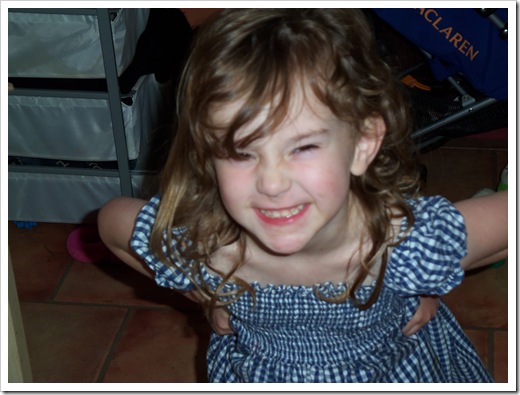But why are you crying?

I am constantly amazed at how grown-up Rosemary is becoming – though, as she says ‘Well, I am four now!’ She’ll notice something I’ve left in Eleanor’s reach, or tell me all about the story Chris read her the night before, or recognise and write a bunch of letters, or solve a problem. Her drawing skills are improving fast and it’s fascinating to watch and listen to her draw on her wipeboard desk, as she gradually adds and removes details, providing a running commentary of the whole thing. She listens to explanations and says ‘I see’ while tilting her head to one side. She’ll sit down for half an hour doing maths worksheets, or spend fifteen minutes using her Scribble and Write pad to practise her letters.
But then, suddenly, seemingly from nowhere at all will come a scream. A high-pitched, angry scream, often accompanied by kicking, stamping, throwing things, slamming doors. The kind of scream that I associate with teenagers, not four-year-olds. And the triggers do not make any sense. A small thing that hasn’t gone the way she wants it to can trigger the scream, but the same small thing at some other point would elicit an ‘Oh, poopy pants. I wanted it that way.’ Being told not to do something can bring on the scream, but equally it can result in her nodding and saying ‘OK, mum, I’ll remember,’ or ‘OK, Dad, I won’t do it again.’
We’re learning gradually that there really is nothing you can do for this scream. Logical explanations do not work – at least not in the midst of it. Telling off just makes is worse – unsurprisingly, really. Any attempts at physical restraint (sometimes essential if there’s a little sister in the vicinity) tend to result in bumps and bruises all round. Trying to solve the problem while the screaming is still running, is pointless, as it tends to intensify the screaming and we get the addition of ‘Stop talking! Stop talking! Stop talking, NOW!’ Trying to work out what is wrong, is equally futile. ‘But why are you crying? I don’t understand. How can I help you?’ The response to most of these is ‘Arggh!’, shouted at intervals designed to block whatever we are saying.
What works best, for the most part, is to withdraw to another room, saying something like ‘I’ll just go through and load the dishwasher. You come through when you’re ready.’ Generally, it peters out quite quickly and she’ll come through, acting as if nothing has happened. She’ll come and tickle Eleanor, or just come through and start chatting about something ‘Do you know, Mummy, that there’s an alien living in the basement?’ Sometimes, once she’s calmed down, she’ll be open to talking about what set her off, and she’ll listen to suggestions about how to avoid it in future. But, really, I don’t think it’s going to disappear completely for a little while, at least, and having strategies for staying calm is all very well, but mostly she really seems to have no control over these responses.
I know that at least a couple of Rosemary’s peers are having the same issues. In fact, Rosemary seemed very relieved to find out that one of her friends was going through the same thing, so I think maybe it’s a little frightening for her. It’s reassuring to us, too, not that it stops us trying to help her through it (and, ultimately, stop the horrible screams, because they really, really are incredibly annoying!).
How about your children? Are they or did they go through something similar at 4 or 5 years? Is it maybe a subconscious reaction to the impending start of school? What did/do you do? Should we be putting our feed down and doing time out or something, or is it better to walk away and ignore it, then talk it through when it’s calmer? What worked for you? How long did it last?
Photo taken with the Kodak EasyShare M580

Leave a Reply